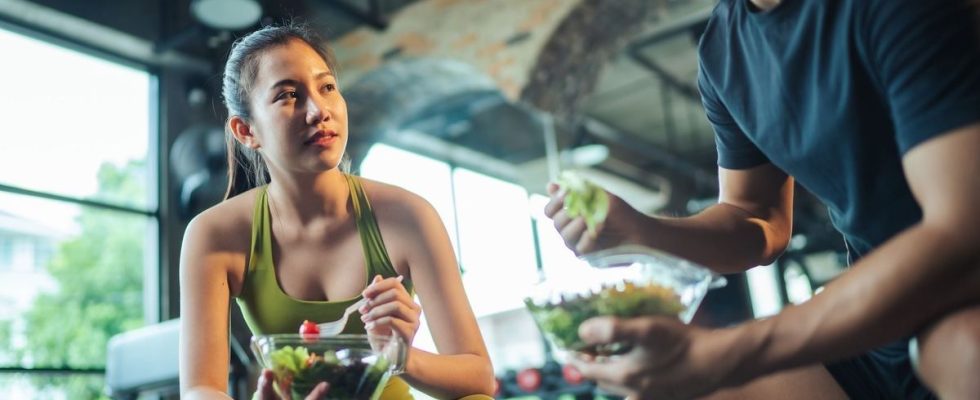Published on
Updated
Reading 3 min.
in collaboration with
Alexia Cornu (sports and nutrition coach)
You never know what to eat before your workout? Discover the advice of Alexia Cornu, sports and nutrition coach to put together the best menus before exercise!
Many athletes ask themselves the question: should you eat before training? If so, how should you eat? Alexia Cornusports and nutrition coach, advises us and takes the opportunity to put an end to several popular beliefs…
Eating before sport: is it really a good idea?
“Eating a banana or a cereal bar to gain strength before sport is a popular belief”, confides the expert. In fact, she specifies that he is “not recommended to eat just before training, and even less so carbohydrates”.
Alexia Cornu adds: “Consuming carbohydrates just before a session causes an insulin spike mid-workout.” You have to be careful because “this could increase the risk of hypoglycemia at the end of the session”.
On the other hand, “exercising directly after a meal is counterproductive“, she confides. Indeed, digestion is a stage that requires a lot of energy. We cannot therefore give our maximum energy during the sports session and performances are less good. In the same way, the sport disrupts the digestion process and thus makes it more complicated. Result: you lose twice!
So, when should you eat? “I advise eating three or four hours before the session“, specifies the coach. People tend to think that doing sports without having eaten for a long time is dangerous, but in reality, “the body is fully capable of exercising several hours later. It simply uses the energy it recovered during the last meal” according to our expert. She adds : “This is why it is essential to have a balanced general diet”. So we forget the raclette before going for a run (even with the four-hour delay)!
Make sure you eat properly after exercise
According to Alexia, “Everything depends on the meal that comes after the session”. Indeed, the quality of food is very important, especially after sport because according to the expert: “this is what we give the body so that it recovers”.
How to build your plate? The nutrition coach responds: “50% of the plate must be composed of plants. The rest is made up of proteins and carbohydrates. The ratio of these two contributions varies depending on the activity carried out beforehand.
After a weight training session, for example, you will need to focus on a high protein intake. The goal? To allow the muscles to recover properly and promote their growth. You must also consume a little carbohydrate, in order to regain the energy drawn during training. Finally, don’t forget to add healthy fats to this plate, such as avocado or fatty fish.
For more intense activities like cardio or endurance, the post-session meal should contain a little more carbohydrates. Indeed, “as we expend more energy during this type of effort, we need to regain more resources after the session”. The nutrition coach advises “favor carbohydrates such as rice, legumes and whole grains. Conversely, pasta and bread should be avoided”. Although the ratio is different from bodybuilding, we must not forget to maintain a protein intake.
Small specificity for high-level athletes
Alexia concludes by specifying that “all the advice given is intended for active people, who practice on average less than 10 hours of sport per week”. For high-level athletes, the rules are a little different.
The expert explains: “Being more prone to injuries, especially related to their diet, athletes need a significant caloric intake. This therefore leads them to eat just before their session and sometimes even during”. In general, these are food supplements to drink because “this form prevents them from being subjected to the digestion process which could tire them during their session”.
Alexia would like to point out that “C“food supplements and this feeding rate is absolutely not necessary as part of a normal practice of sport”.
